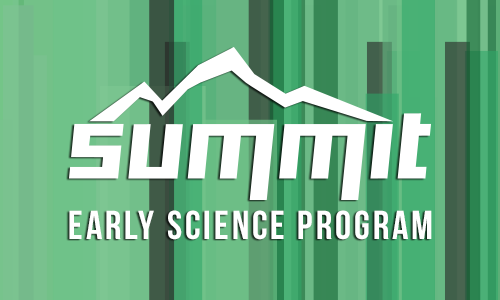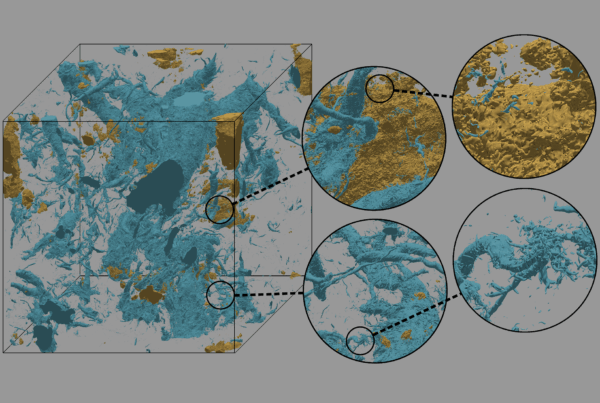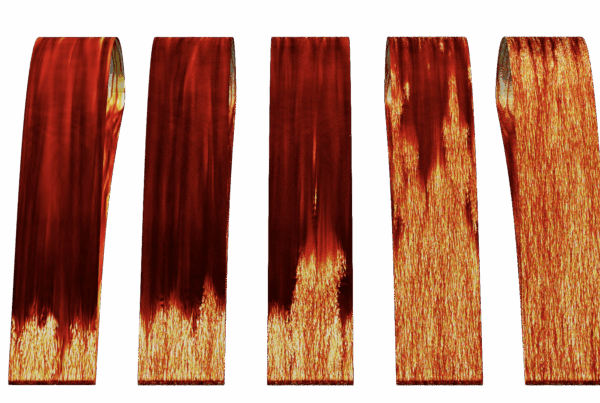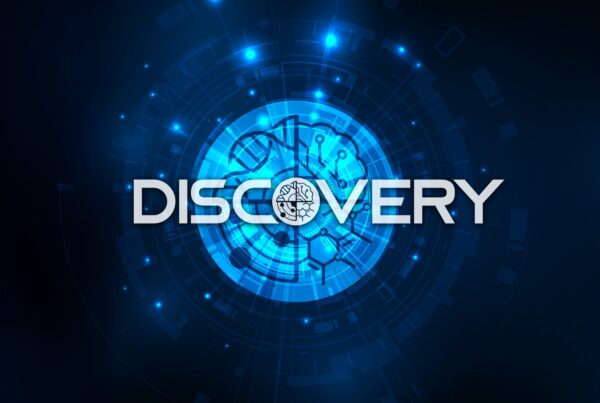The OLCF has now completed acceptance testing on the new Summit supercomputer and will begin ramping up the Summit Early Science Program over the next few weeks. Most immediately we have provided the Center for Accelerated Application Readiness (CAAR) teams access to Summit to complete work needed to satisfy key performance metrics required to meet Summit project targets. As these projects transition into the early science phase of their proposed work we will begin enabling the Early Science Projects that have been approved for Summit access based on internal OLCF review and resource availability. Formal proposal decision notifications have now been sent in response to all Early Science Program submissions.
Overall, approximately 5 billion equivalent Titan core hours will be allocated to this program, which is equal to over one year of dedicated Titan system access. We expect that all approved projects will be enabled by early January.
Astrophysics
Frontier Precision Cosmology with HACC
Salman Habib, Argonne National Laboratory
Software Application: HACC
Modeling Stellar Explosions and Their Nucleosynthesis with an Optimized FLASH Code
Bronson Messer, Oak Ridge National Laboratory
Software Application: FLASH
GPU-accelerated General Relativistic Magnetized Simulations of Neutron Star Binary Merger Remnant Disks and Tilted Thin Accretion Disks
Alexander Tchekhovskoy, Northwestern University
Software Application: GRMHD
Bioinformatics
Attacking the Opioid Epidemic: Determining the Epistatic and Pleiotropic Genetic Architectures for Chronic Pain and Opioid Addiction
Daniel Jacobson, Oak Ridge National Laboratory
Software Application: COMET
Biophysics
Protocell: Petascale Simulation with NAMD and VMD Helps Understanding Cells at the Atomic Level
Emad Tajkhorshid, University of Illinois, Urbana-Champaign
Software Application: NAMD
All-atom simulations of motor proteins for cellular energy metabolism
Abhishek Singharoy, Arizona State University
Software Application: NAMD
Large-Scale Simulation of Biological Crystallization
Sharon Glotzer, University of Michigan
Software Application: HOOMD
Chemistry
High-Accuracy Calculations on Metal-Organic-Frameworks
Dmytro Bykov, Oak Ridge National Laboratory
Software Application: LS-DALTON
Accurate calculations on complex systems containing early actinides (Th-Pu)
Lucas Visscher, Vrije Universiteit Amsterdam
Software Application: DIRAC
Highly accurate electronic structure methods for ground and excited states at scale: Addressing problems in energy capture, transfer and storage
Sotiris Xantheas, Pacific Northwest National Laboratory
Software Application: NWChem
Nanoscale Design of Contacts to Atomically Precise Graphene Devices
Jerry Bernholc, North Carolina State University
Software Application: RMG
Organic Photovoltaic Materials Design Using the GronOR Non-Orthogonal Configuration Interaction Software
Remco Havenith, University of Groningen
Software Application: GronOR
Combustion
First Principles Investigation of Turbulent Scalar-Mixing and Combustion in Supercritical Fluids
Joseph Oefelein, Georgia Tech
Software Application: RAPTOR
Direct Numerical Simulation of Diesel Autoignition with S3D LEGION
Jacqueline Chen, Sandia National Laboratories
Software Application: S3D
Earth Science
Global Adjoint Tomography with Workflow Management
Jeroen Tromp, Princeton University
Software Application: SPECFEM
Cloud-resolving Climate Modeling of the Earth’s Water Cycle
David Bader, Lawrence Livermore National Laboratory
Software Application: E3SM
Low-order Unstructured Finite-element Earthquake Simulation on Summit
Kohei Fujita, University of Tokyo
Software Application: MOHTRA
Engineering
Full Power Simulation of the Watts Bar Nuclear Reactor using the Shift Monte Carlo Transport Solver
Steven Hamilton, Oak Ridge National Laboratory
Software Application: EXNIHILO
Fluid Dynamics
Enabling Human Exploration of the Red Planet
Eric Nielsen, NASA
Software Application: Fun3D
Simulating Two-Fluid Flow in Porous Media at the Laboratory Scale
James McClure, Virginia Tech
Software Application: LBPM
Fusion Energy
Using XGC to predict ITER’s boundary plasma performance and its impact on fusion efficiency
CS Chang, Princeton Plasma Physics Laboratory
Software Application: XGC
Integrated Simulation of Energetic Particles in Burning Plasmas
Zhihong Lin, University of California, Irvine
Software Application: GTC
High Energy Physics
Hot-dense Lattice QCD for RHIC Beam Energy
Swagato Mukherjee, Brookhaven National Laboratory
Software Application: RHMC
The structure of the proton and the search for physics beyond the Standard Model
André Walker-Loud, Lawrence Berkeley National Laboratory
Software Application: QUDA
Machine Learning
Scalable Machine Learning of Scientific Data
Robert Patton, Oak Ridge National Laboratory
Software Application: MENNDL
Exascale Deep Learning
Prabhat, Lawrence Berkeley National Laboratory
Software Application: TENSORFLOW
Solving an 80-year old Inverse Problem in Materials with Distributed Deep Learning
Nouamane Laanait, Oak Ridge National Laboratory
Software Application: DNN
Exascale AI to Advance Health Using Big Heterogeneous Biomedical Data
Georgia Tourassi, Oak Ridge National Laboratory
Software Application: CNN
Materials Science
Structurally complex oxides with Quantum Monte Carlo
Paul Kent, Oak Ridge National Laboratory
Software Application: QMCPACK
Nuclear Physics
The neutrino-less double beta-decay of calcium-48
Gaute Hagen, Oak Ridge National Laboratory
Software Application: NUCCOR
Hadrons, nuclei and fundamental symmetries
Robert Edwards, Thomas Jefferson National Accelerator Facility
Software Application: QDP-jIT
Turbulence
Extreme-scale Simulations of Fluid Turbulence
PK Yeung, Georgia Tech
Software Application: DNS
First-principle based flow simulations of a high-pressure turbine vane at engine-relevant Reynolds number subject to grid-generated turbulence
Richard Sandberg, General Electric
Software Application: HipSTAR






